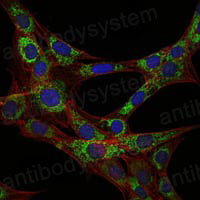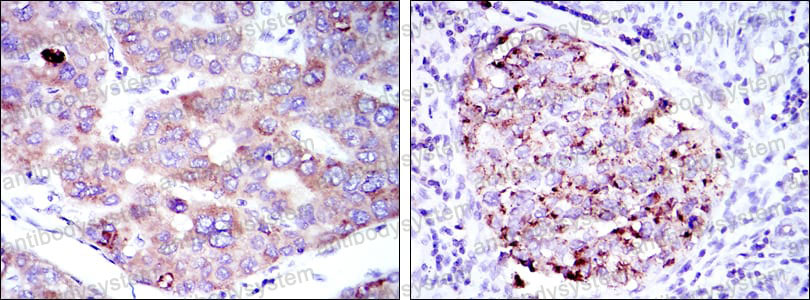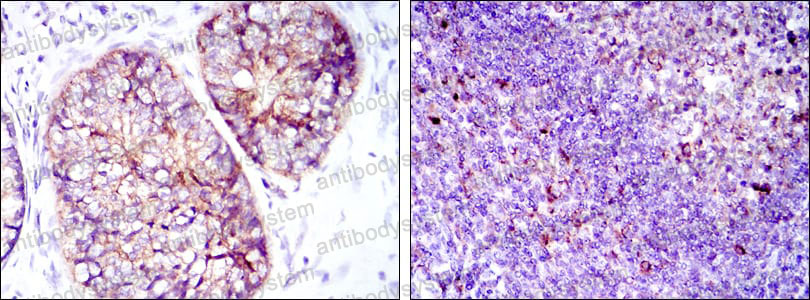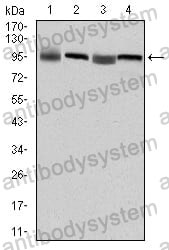Catalog No.
RHC99105
Species reactivity
Human
Host species
Mouse
Isotype
IgG1
Clonality
Monoclonal
Tested applications
ELISA: 1:10000, IF: 1:200-1:1000, IHC: 1:200-1:1000, WB: 1:500-1:2000
Target
EF-2, EF2, EEF2, Elongation factor 2
Concentration
1 mg/ml
Endotoxin level
Please contact with the lab for this information.
Purity
>95% as determined by SDS-PAGE.
Purification
Protein A/G purified from cell culture supernatant.
Accession
P13639
Applications
ELISA, IF, IHC, WB
Form
Liquid
Storage buffer
0.01M PBS, pH 7.4, 0.05% Sodium Azide.
Stability and Storage
Use a manual defrost freezer and avoid repeated freeze-thaw cycles. Store at 4°C short term (1-2 weeks). Store at -20°C 12 months. Store at -80°C long term.
Clone ID
R3D23
Screening colorectal cancer associated autoantigens through multi-omics analysis and diagnostic performance evaluation of corresponding autoantibodies., PMID:40240912
The FAM86 domain of FAM86A confers substrate specificity to promote EEF2-Lys525 methylation., PMID:37209825
Engineering of Ribosome-inactivating Proteins for Improving Pharmacological Properties., PMID:32182799
Eukaryotic elongation factor 2 is involved in the anticoccidial action of diclazuril in the second-generation merozoites of Eimeria tenella., PMID:31770701
mTORC1 Signaling in Individual Human Muscle Fibers Following Resistance Exercise in Combination With Intake of Essential Amino Acids., PMID:31294029
eEF-2 Kinase-targeted miR-449b confers radiation sensitivity to cancer cells., PMID:29331413
Depression of leukocyte protein synthesis, immune function and growth performance induced by high environmental temperature in broiler chickens., PMID:28455634
Influence of DPH1 and DPH5 Protein Variants on the Synthesis of Diphthamide, the Target of ADPRibosylating Toxins., PMID:28245596
Towards Engineering Novel PE-Based Immunotoxins by Targeting Them to the Nucleus., PMID:27834892
An Integrative Proteomic Approach Identifies Novel Cellular SMYD2 Substrates., PMID:27163177
Altered machinery of protein synthesis is region- and stage-dependent and is associated with α-synuclein oligomers in Parkinson's disease., PMID:26621506
BDNF - a key transducer of antidepressant effects., PMID:26519901
PP2A inhibition overcomes acquired resistance to HER2 targeted therapy., PMID:24958351
The translation elongation factor eEF2 is a novel tumor‑associated antigen overexpressed in various types of cancers., PMID:24589652
Hypoxia integration in the serological proteome analysis unmasks tumor antigens and fosters the identification of anti-phospho-eEF2 antibodies as potential cancer biomarkers., PMID:24130777
HER2-affitoxin: a potent therapeutic agent for the treatment of HER2-overexpressing tumors., PMID:21791637
Sumoylation of eukaryotic elongation factor 2 is vital for protein stability and anti-apoptotic activity in lung adenocarcinoma cells., PMID:21554491
Cytoprotective effect of the elongation factor-2 kinase-mediated autophagy in breast cancer cells subjected to growth factor inhibition., PMID:20300520
Identification of melanoma antigens using a Serological Proteome Approach (SERPA)., PMID:20181627
Oxytocin receptor signalling., PMID:18655881
Identification of hepatocellular-carcinoma-associated antigens and autoantibodies by serological proteome analysis combined with protein microarray., PMID:18161940
Quantification of diphtheria toxin mediated ADP-ribosylation in a solid-phase assay., PMID:17712004
Levels of mTOR and its downstream targets 4E-BP1, eEF2, and eEF2 kinase in relationships with tau in Alzheimer's disease brain., PMID:16098202
High hydrostatic pressure inhibits the biosynthesis of eukaryotic elongation factor-2., PMID:15534876
Identification of a hypothetical membrane protein interactor of ribosomal phosphoprotein P0., PMID:15286401
Effect of serum and hydrogen peroxide on the Ca2+/calmodulin-dependent phosphorylation of eukaryotic elongation factor 2(eEF-2) in Chinese hamster ovary cells., PMID:11795480
Glutamate-dependent phosphorylation of elongation factor-2 and inhibition of protein synthesis in neurons., PMID:9133370
Elongation factor-2 kinase: immunological evidence for the existence of tissue-specific isoforms., PMID:8941713
Interaction of the calcium and calmodulin regulated eEF-2 kinase with heat shock protein 90., PMID:8050573
High-resolution one-dimensional polyacrylamide gel isoelectric focusing of various forms of elongation factor-2., PMID:1519762




